Humanities & Social Sciences
Mak Department of Journalism & Communication Engages with Pioneer Class to Enhance Course Progress
Published
3 years agoon
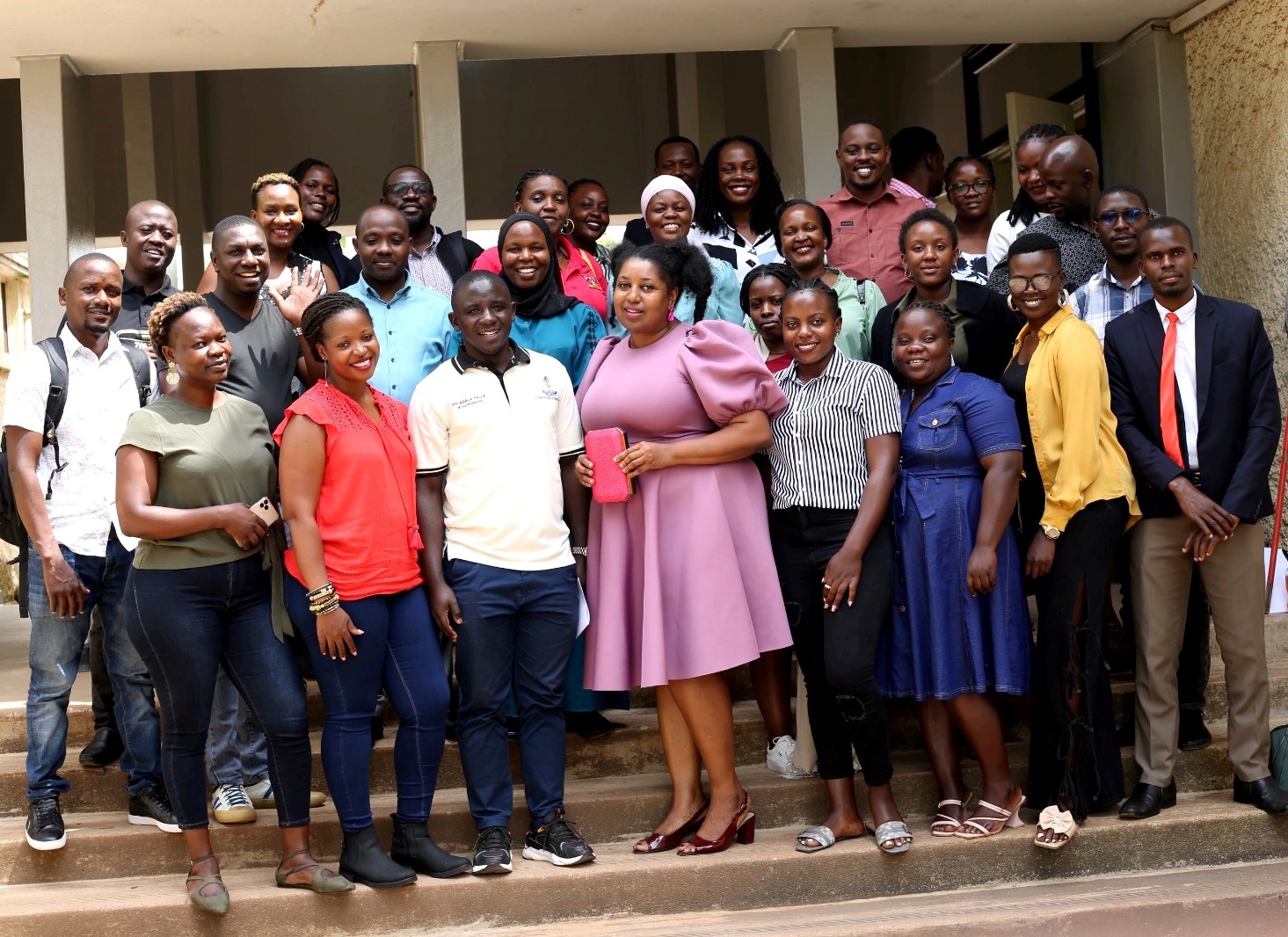
In a bid to foster academic excellence and ensure the smooth progression of the Master of Arts in Journalism and Communication (MAJM) and Master of Strategic and Corporate Communication (MASC) programs, Makerere University‘s Department of Journalism and Communication held a meeting with the pioneer class of these courses. The gathering on Friday June 23, 2023 in Lecture Room 4 aimed to discuss the students’ course progress and provide motivation for timely completion.
The meeting followed the successful conclusion of the first academic year for the 2022/2023 cohort. Students together with their esteemed lecturers gathered for a productive and cordial engagement, focusing on streamlining the upcoming academic year and emphasizing the importance of meeting course objectives and deadlines.
During the engagement, Dr. Aisha Nakiwala, a Senior Lecturer and the Head of Department, expressed satisfaction in the students’ progress and emphasized their unique position as pioneers of these programs. She urged the students to recommit themselves to the shared goal of completing the programs within the stipulated two-year timeframe.
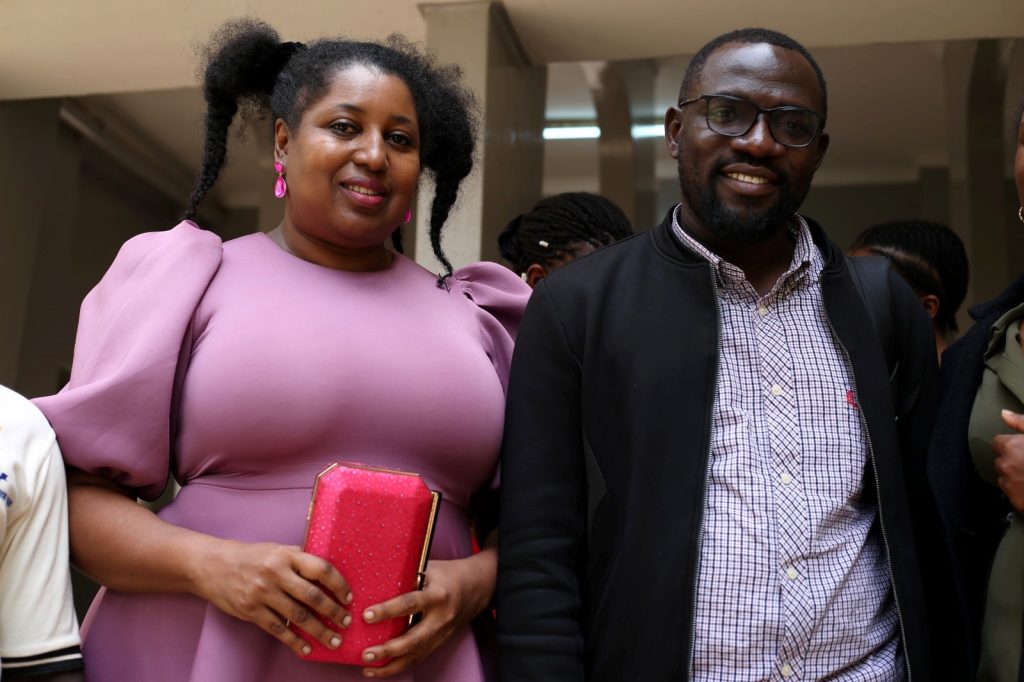
“By the end of the two-year period, you will have undergone a profound transformation. Our hope and promise are that everyone will achieve remarkable personal growth within this timeframe. We understand that unforeseen challenges may have emerged along the way. It is important to note that criticism is commonplace in academia, and we are used to navigating such circumstances. We genuinely care about your well-being and wish you all the best. We strive to enhance and improve the program continuously, so we highly appreciate any feedback you have regarding areas that need improvement. Your input will be carefully considered as we work towards refining the program for your benefit and for future participants,” said Dr. Nakiwala.
Dr. Nakiwala, commended the remarkable achievement of the two new programs introduced at Makerere University. She cites the Department received an impressive more than double expected applications but admitted only 40 individuals to each program, maintaining a selective acceptance rate of 50% in the 2023/2024 academic year application.
According to Dr. Nakiwala, this rigorous selection process ensured that the highest caliber of students was chosen to participate. Further stressing the importance of ensuring the pioneer students to stay focused and complete the program by June 30th, 2024, ensuring a smooth transition for incoming students. She acknowledged that challenges may arise along the way but assured students that criticism is common in academia, and the department is well-prepared to navigate such situations.
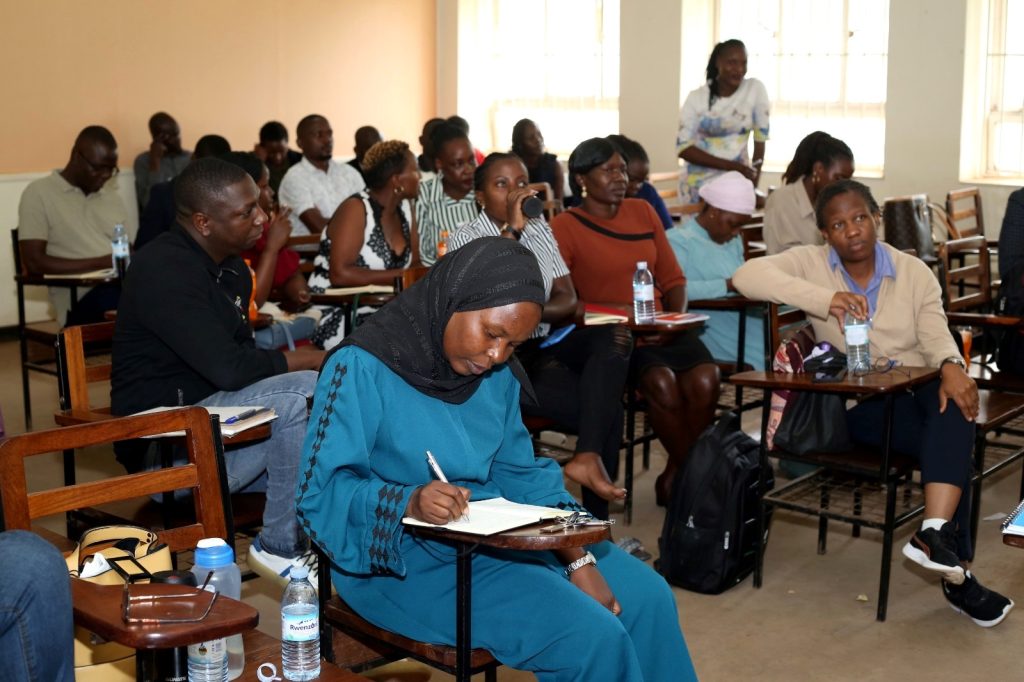
“Our primary objective is to see each one of you successfully complete this program. Therefore, I urge you to reaffirm your commitment to finishing within the designated two-year timeframe. It means that your dissertation should have been submitted to the graduate school for supervision and evaluation. Looking ahead, the upcoming year may appear less demanding, but it will require additional effort and meticulous attention to detail,” Dr. Nakiwala said.
On her part, Dr. Marjorie Kyomuhendo-Niyitegeka, a Lecturer and Programmes Coordinator in the Department of Journalism and Communication, emphasized the significance of time management and avoiding procrastination. She highlighted the extensive course content and the need for consistent progress, emphasizing that even short periods, such as a week or a month, hold immense importance in achieving academic success. She expressed eagerness on behalf of the faculty to work closely with the students as future supervisors, guiding them throughout their academic journey.
“Congratulations on successfully completing your first year! It was a rewarding experience for me to teach all of you, and I want you to know that we highly appreciate you as the pioneering group of this program. You serve as our ambassadors in the world out there. I urge you to carry forward the same enthusiasm and energy into the upcoming semester,” said Dr. Kyomuhendo-Niyitegeka.
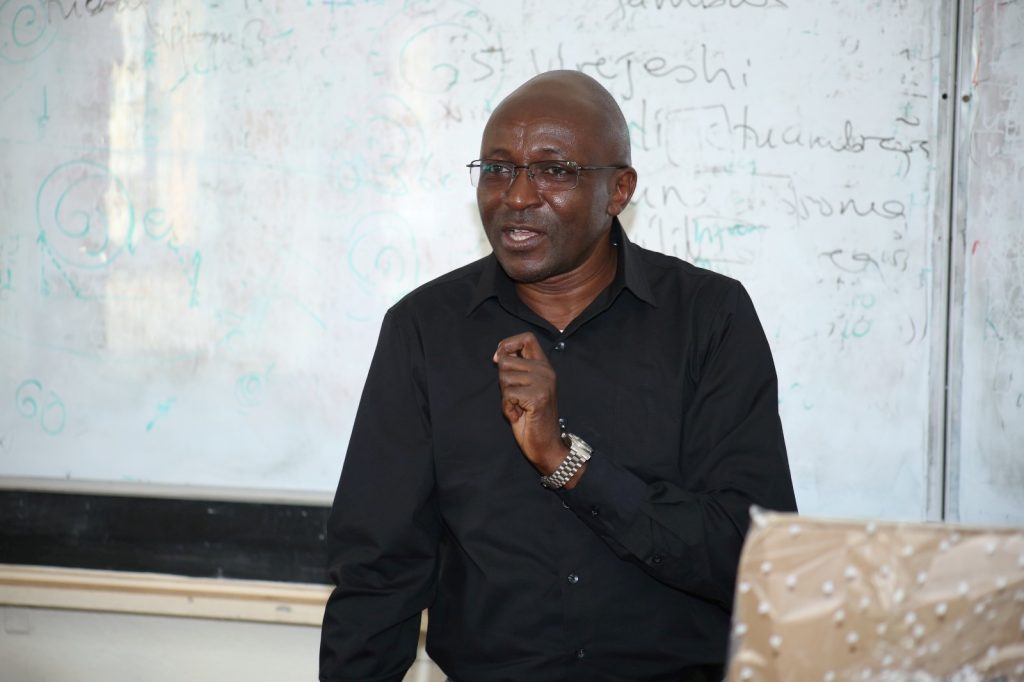
For Dr. Mbaine, a lecturer in Media Law, Policy, and Regulation, students need to be proactive in addressing challenges and complete their studies on time. He highlighted the quality of education they have received and shared an anecdote about a previous student who faced difficulties due to a delayed graduation.
“There is always a fear of lecturers by students and what lecturers are able to do to you as a student. It’s like the lecturers are carrying weapons of mass destruction that at a slightest provocation they can unleash. As a graduate student, you should be able to manage your relationship with your lectures. Being careful about the things you do and say, you have to be very careful about that. There is even what is called graduate politics. You have to be creative in a way you handle yourself. If you do the minimum, people will also help you up to the minimum. Please go out and be worthy ambassadors of the program,” said Dr. Mbaine.
Professor Nassanga Goretti Linda, a Professor at the Journalism and Communication Department and the first Head of the Department, congratulated the students on completing their first year and emphasized the importance of planning and professionally executing their research phase for the upcoming second year.
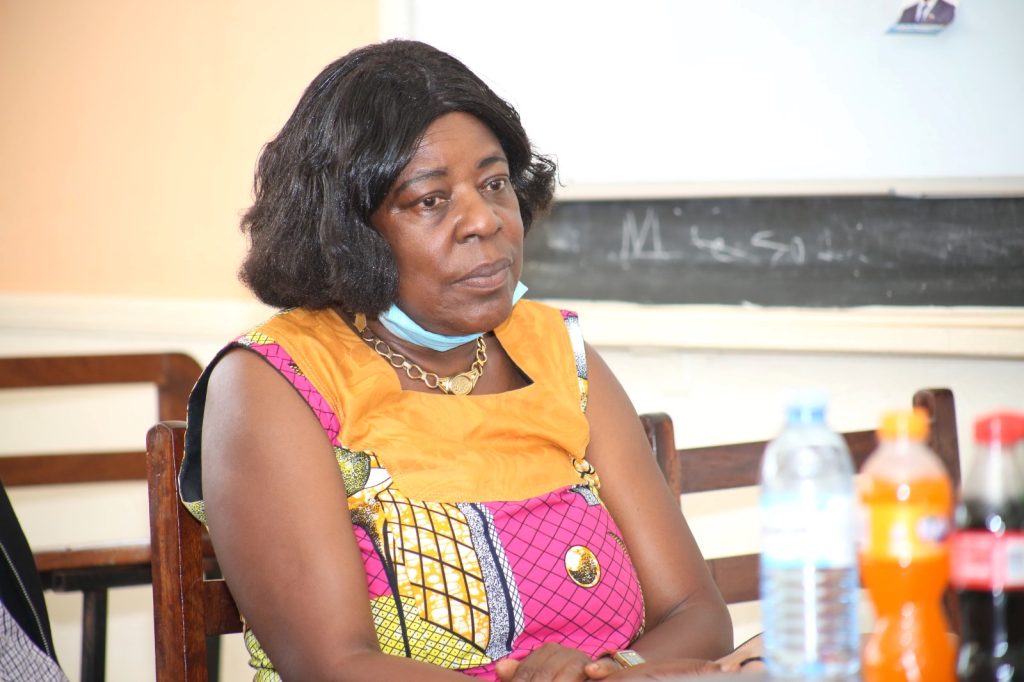
“I implore you to take your research seriously and address the feedback provided by your supervisors in time. Your reports will undergo scrutiny by an external examiner, whose evaluation holds significant weight. However, I urge you not to view this as your sole objective. Imagine if your child, a loved one, or someone else reads your thesis years from now. Do something that will make you proud in future,” said Professor Nassanga.
Dr. Gerald Walulya, the Masters Programmes Coordinator, encouraged the students to seek help and support from the faculty whenever needed. “Align your expectations with the results and match them with your input. When it comes to writing assignments, let’s focus on the fundamentals. Start by reading and then answer assignments. Many of us are readily available for consultations,” he said.
Mr. Sulaiman Kakaire, a journalist turned lawyer and PhD student at Makerere Institute of Social Research (MISR), reminded both students and lecturers to manage their expectations and egos, as graduate politics can become intense, especially at the PhD level.
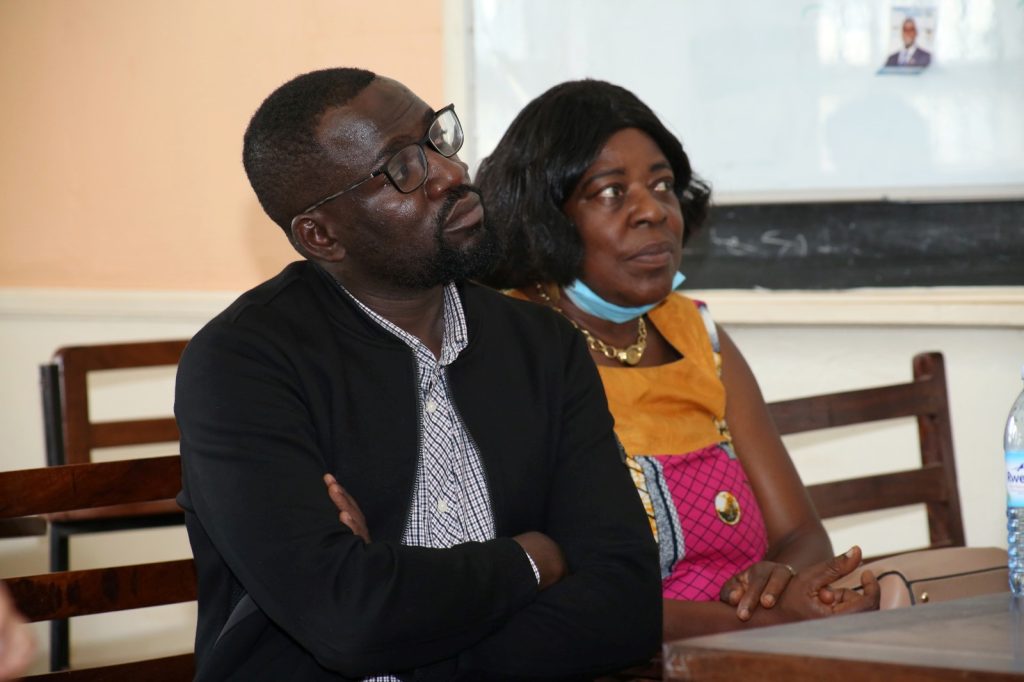
“It requires humility to acknowledge that you are being taught by a colleague whom you have known for a while. No lecturer intends to engage in conflict with a student. Personally, I welcomed the feedback I received and never took it personally. I embraced the remedial classes when some of you invited me as they offered us an opportunity to learn and improve,” Mr. Kakaire said.
Ms. Sarah Kagingo, CEO of Soft Power Communications and Vice Chairlady of Private Sector Foundation Uganda, on behalf of the pioneer students expressed gratitude for the transformative journey they had embarked on and highlighted their enhanced critical thinking skills. She also emphasized the importance of considering multiple perspectives and authentic lived experiences to become effective ambassadors for the department.
“It’s said that PR is investment in the bank of goodwill but it takes two to tangle and we often fall short. Several heads of communication claim their organisations are responsive yet they do not pick their phone calls. It’s through authentic lived experiences that we will truly represent the Department as Ambassadors. Several of us have been unwell and we thank you for rendering us support. There have been times I have comforted colleagues and put up a face of strength yet I’m breaking internally – I am a human being. I’m grateful for my colleagues, the discussions were both rigorous and fun. The next semester will be seamless, in shaa Allah,” Ms. Kagingo.
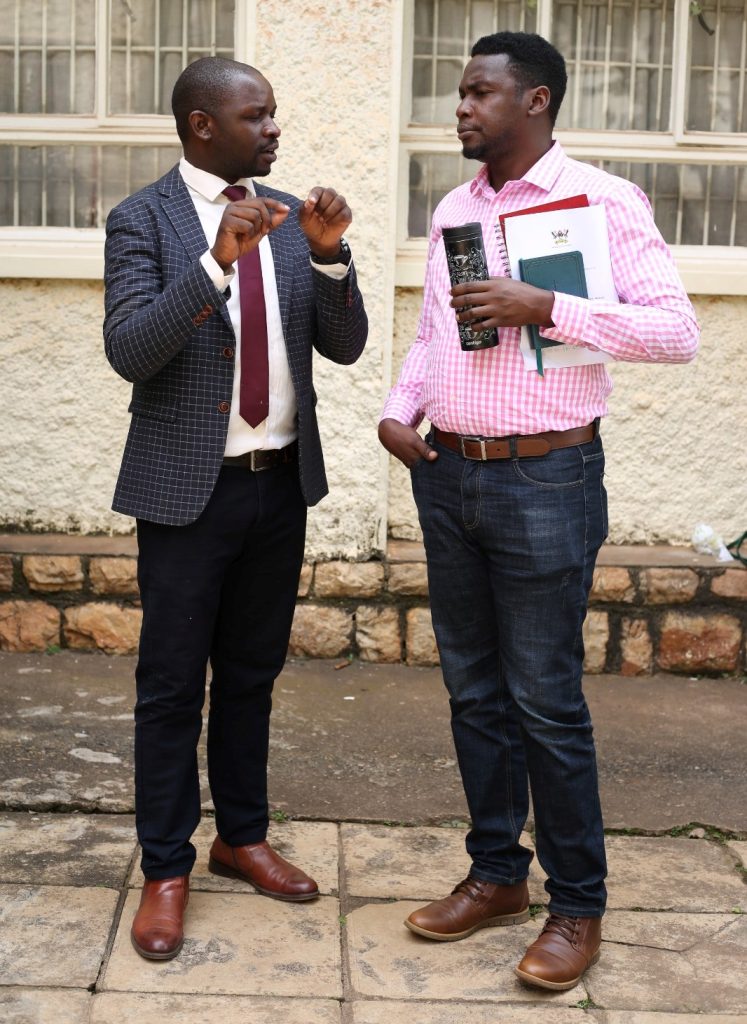
Pastor Mark Arnold Odeke, one of the pioneer students, called for collaboration and mutual respect between Lecturers and Students. He stressed the importance of supporting the growth of the profession through progressive efforts.
“I want to apologize on behalf of the class. Whatever might have happened throughout this year was solely for academic purposes and was not intended as part of the learning process. As we move into the next phase, let us strive for a more productive and positive learning environment, said Odeke.
The meeting concluded with a celebratory cake-cutting ceremony, symbolizing the end of the academic year and serving as a fresh commitment by both students and lecturers to pursue their courses diligently.
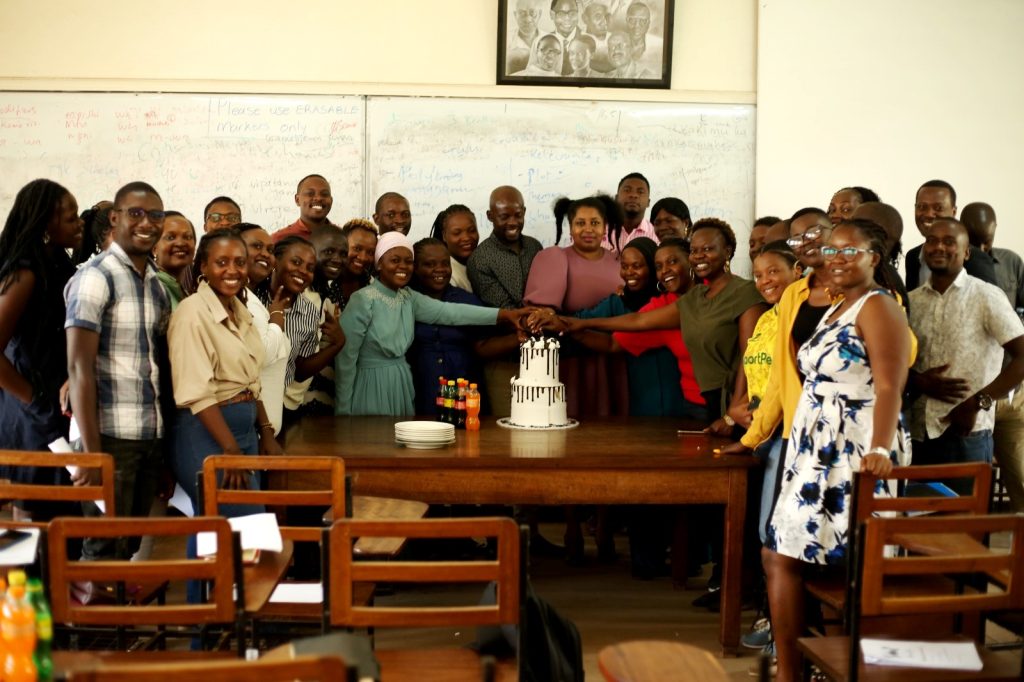
In August 2022, Makerere University‘s Department of Journalism and Communication launched two-year MASC and MAJM programs. The two programs are designed to meet the needs of the corporate and public sectors, which are increasingly demanding effective communication strategies and areas of journalism and multimedia.
Makerere University‘s MASC program offers students a comprehensive education in behavioral, social, and development communication, preparing them for technological advancements and equipping them with expertise in public relations, research, and ethical communication. With a focus on aligning with industry trends and market demands, the program empowers students to excel in the dynamic communication field and make meaningful contributions to societal well-being in the 21st century.
MAJM program provides advanced training in journalism and multimedia and emphasize theory, practice, and the societal contexts of media, while also exploring new media trends and digital technology. Graduates of the MAJM program will be equipped to meet market expectations, excel in the evolving professional landscape, and contribute to the development of journalism and media sectors. They will also possess critical engagement skills, research capabilities, and the ability to embrace technological advancements.
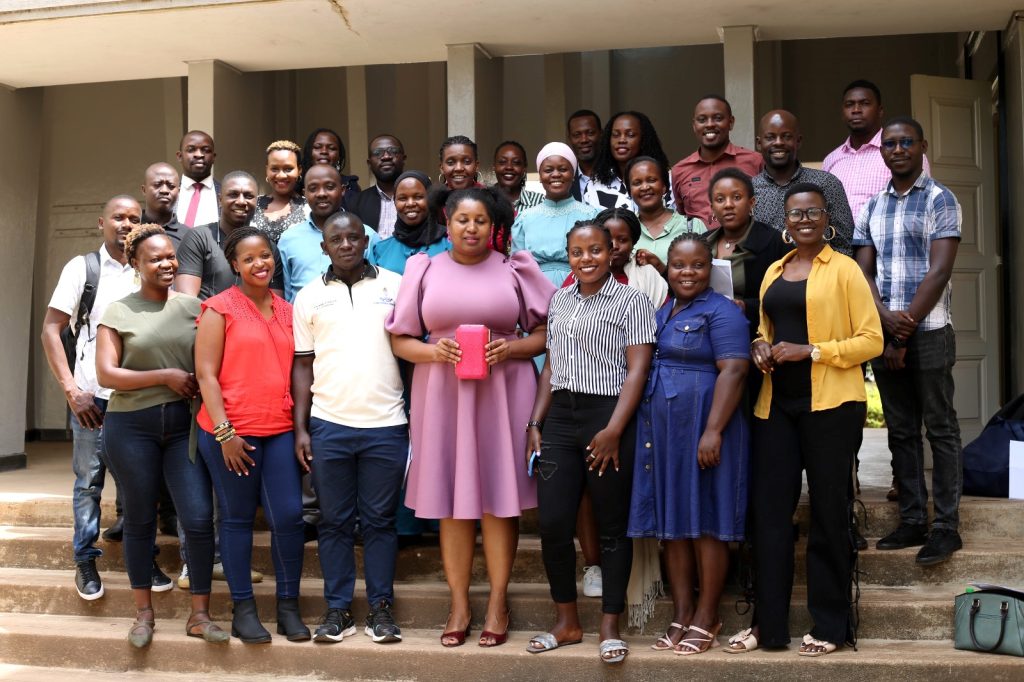
As the pioneer group of these programs, the students play a crucial role in shaping their future and are encouraged to make the most of their education while being mindful of the challenges that may arise along the way.
The writer is also a pioneer student of MA Strategic and Corporate Communication and Communications Officer, Makerere University School of Public Health (MakSPH).
Photography by Ainebyoona Jill
You may like
-


Over 9,200 to graduate at Makerere University’s 76th Graduation
-


76th Graduation Highlights
-


Meet Najjuka Whitney, The Girl Who Missed Law and Found Her Voice
-
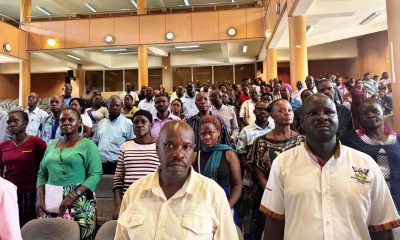

Support Staff Trained to Promote Safety of Students and Stakeholders
-
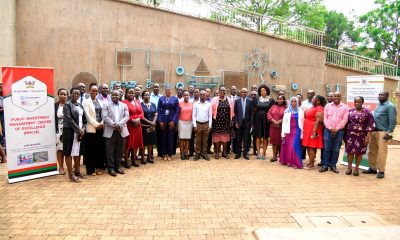

Makerere Hosts Second Cohort of MoKCC&MA Procurement Officers for E&S Safeguards Training
-
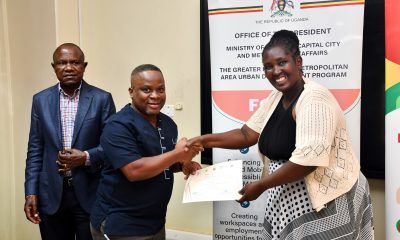

PIM Centre Awards Certificates to MoKCC&MA Officers after Safeguards Training
Humanities & Social Sciences
Meet Najjuka Whitney, The Girl Who Missed Law and Found Her Voice
Published
2 days agoon
February 23, 2026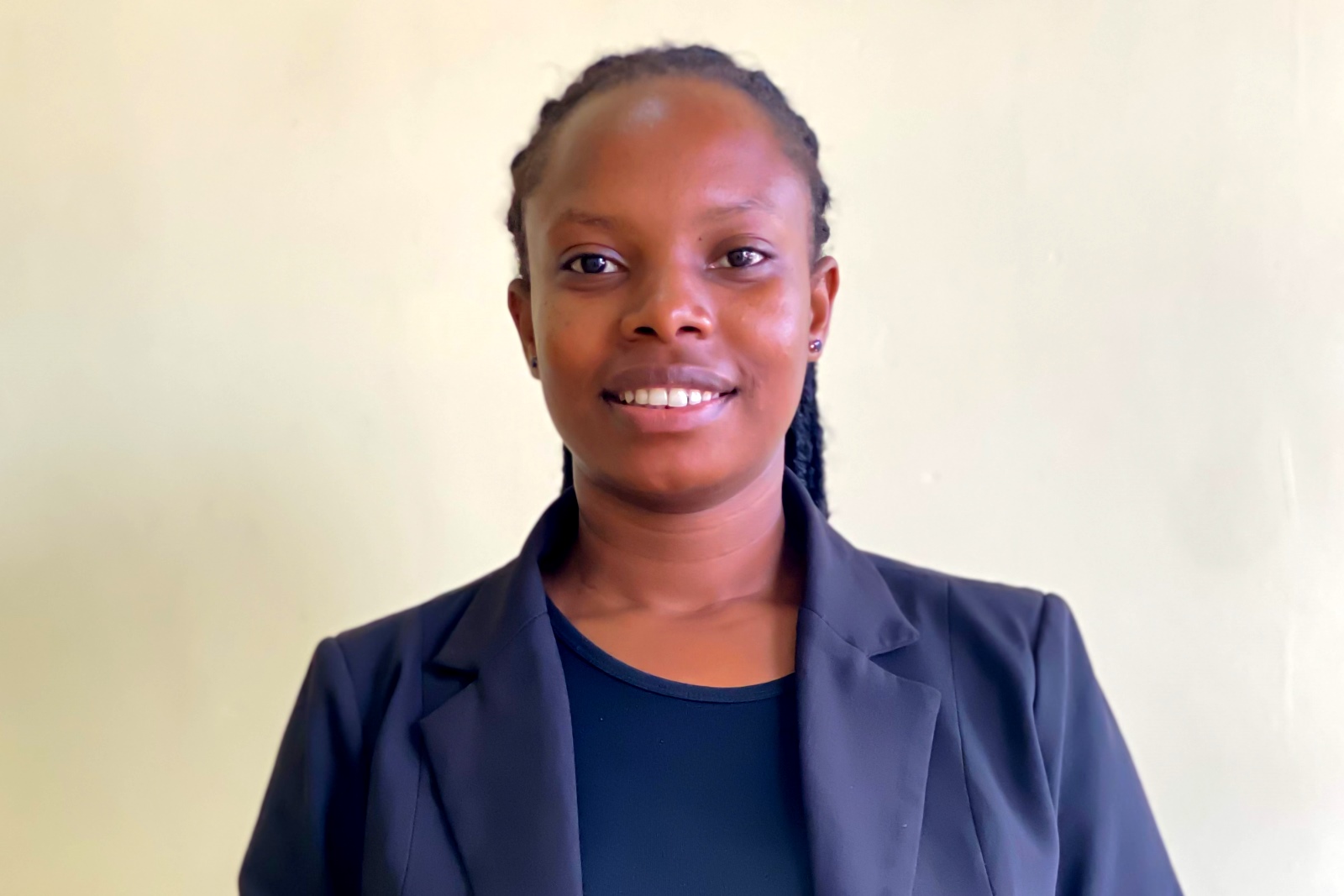
On the morning of Friday, February 27, when the academic procession winds its way across Makerere University’s Freedom Square for the last day of the 76th Graduation Ceremony, Whitney Najjuka will walk into history with a number beside her name: 4.46.
At Makerere, that number means First Class Honours. It means the Vice Chancellor’s List. It means she graduates as the only First-Class student in Journalism and Communication this year. But numbers, as Whitney has learned, rarely tell the full story.
Born on March 27, 2002, in Nabbingo, Kyengera Town Council, to Margaret Kusemererwa and Fred Kasirye, dreamt she would do Law, one of the disciplines, prestigious, almost inevitable next steps for a student who had excelled in secondary school. She had done everything correctly. Studied hard. Scored well. Followed the script.
But Makerere University had other plans. She missed the pre-entry mark, but found her name under Journalism and Communication, another prestigious course offered by the Journalism and Communication Department at Makerere University.
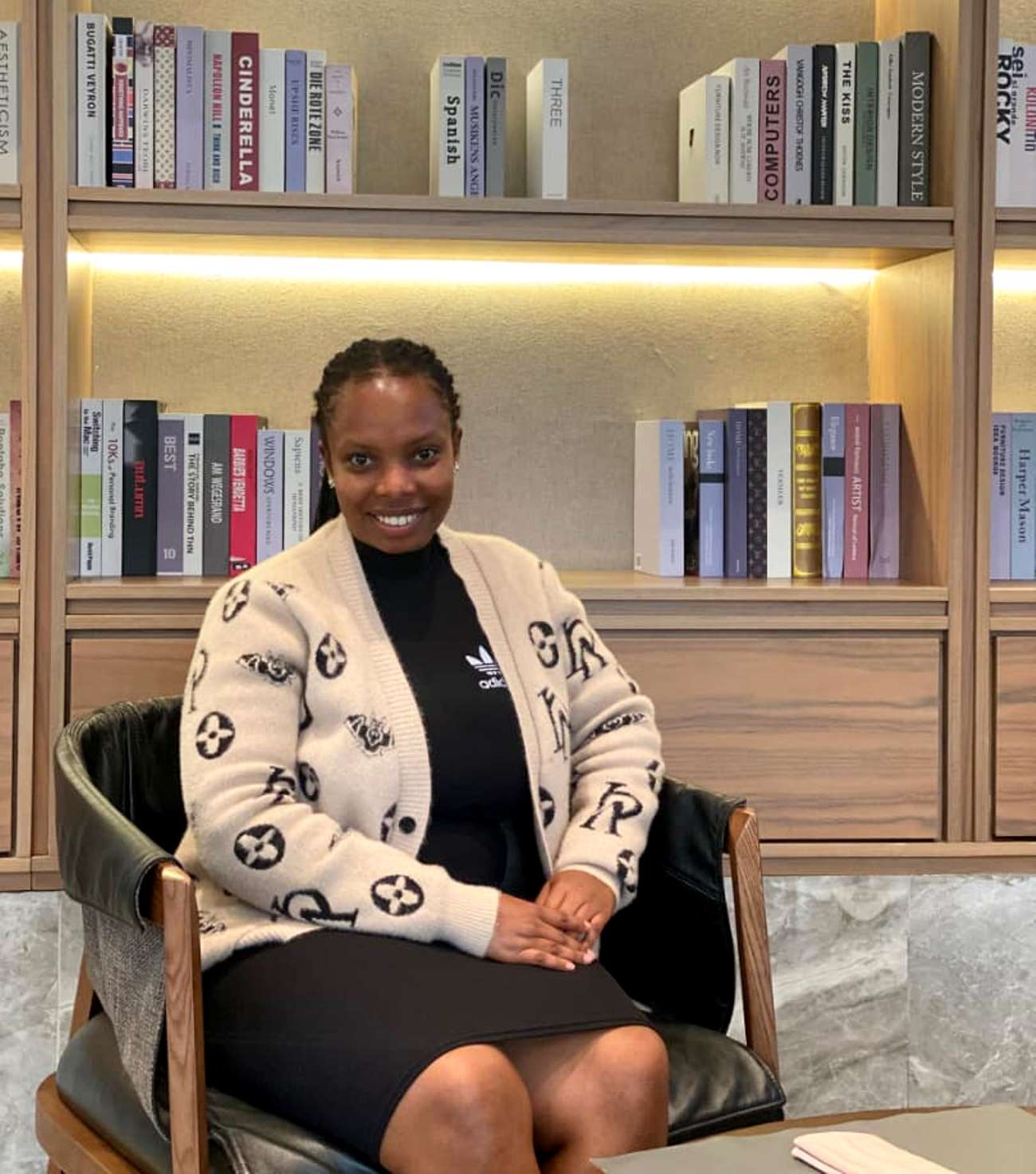
Najjuka began her academic journey at Muto Primary School in Buwama, earning 8 aggregates in the Primary Leaving Examination, a performance that positioned her strongly for secondary school.
She would later join St. Lucia Hill School, Namagoma, where she earned 20 aggregates at O-Level and 17 points in History, Luganda, and Divinity at A-Level.
Missing her dream course, Law, felt at first, like a detour. But Whitney was encouraged by Sanyu Christopher, her uncle, and she settled for a government-sponsored slot in the Bachelor of Journalism and Communication at Makerere, which she had applied for before.
She entered uncertain. But she graduates transformed.
The Pivot That Became a Purpose
Whitney speaks of her early university days with candor. She did not arrive at the Department of Journalism and Communication with a burning childhood ambition to be a journalist, but because another door had closed.
Then, Social and Behavior Change Communication happened. Applied Strategic Communication happened. She began to see media not as headlines and microphones, but as architecture, shaping how societies think, argue, and act.
The turning point came in her third year. The Female Journalist Foundation published her story on Sexual Gender-Based Violence (SGBV) and its emotional toll on survivors. What startled her was not its publication but the reaction. Comments flooded in. Debates ignited, especially about the role of men in combating GBV.
“I realized media doesn’t just report,” she says. “It frames how society views a crisis.”
Her voice, once tentative, had entered a national conversation.
The Discipline Behind 4.46
At Makerere University, a First Class CGPA is not built on brilliance alone but on ritual.
Whitney’s ritual began with showing up, on time, every time. She treated lectures as appointments with her future self. She refused to confine her learning to the syllabus. While attending workshops at the Aga Khan Graduate School of Media and Communication and obtaining external certifications, she sought and was open to mentorship through the Public Relations Association of Uganda (PRAU).
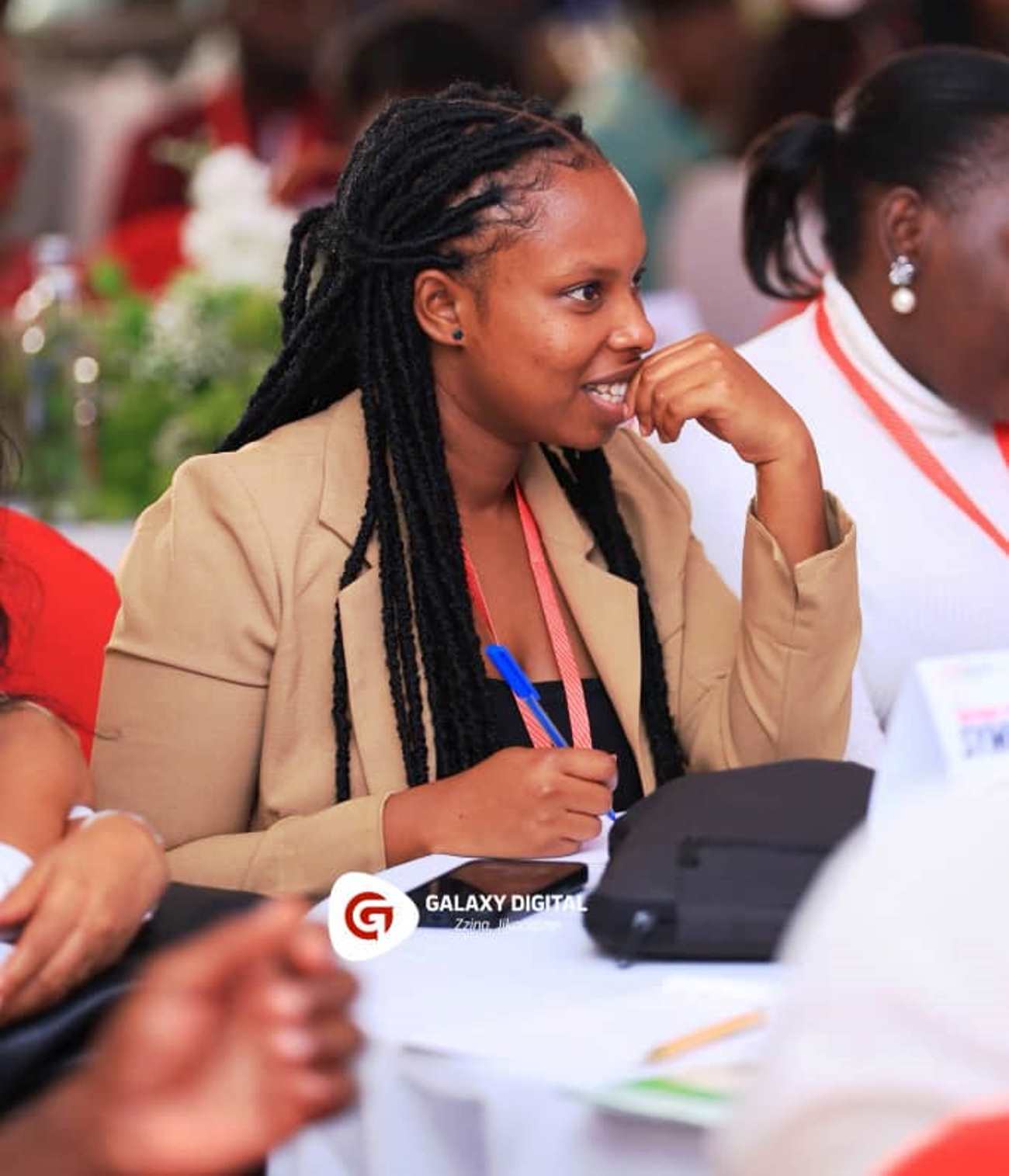
She wanted theory anchored in practice. And then there was the commute.
From Nabbingo, a hill in Wakiso District, some 18.6 km to Kampala, where the Makerere Main campus is situated, and back, nearly 20 hours a week dissolved into Kampala traffic. Two-hour journeys before 8:00 a.m. lectures. Dust. Noise. Headaches. She learned to manage energy the way others manage time. Fatigue became a tutor in resilience.
“I had to be intentional with every remaining hour,” she says. “Excuses were not an option.”
Learning to Practice Communication
If classrooms taught her analysis, presentations taught her courage. Pitching projects, defending research, and standing before peers quick to critique forced her to think on her feet. She was no longer simply studying communication; she was practicing it.
In 2024, the AGMES Fellowship at the Aga Khan Graduate School of Media and Communication pushed her further. She received funding to produce a capstone project on the mental impact of gender-based violence on survivors. She identified sources, conducted interviews, handled trauma with care, and worked with professional editors.
The Communication, she learned, is logistics and ethics as much as eloquence.
The Future She Sees
Whitney is optimistic about Uganda’s media landscape. The digital shift, she believes, has democratized influence. Young communicators are no longer confined to legacy newsrooms or offices.
Yet she sees a gap in the absence of structured research on sustainable, ethical, profitable independent media ventures in Uganda. Her ambition is not only to practice communication, but to study it. To produce data-backed frameworks that help young Ugandans transition from graduates to media entrepreneurs.
She wants to make the impact scalable.
What Remains
As the only First-Class graduate in her cohort, she is careful not to mythologize herself. “Success isn’t brilliance alone,” she says. “It’s a daily commitment when nobody is watching.”
Even before graduation, Whitney had stepped into the industry through a mentorship internship at Capital One Group (COG EA Ltd), a strategic marketing communications agency operating across East Africa.
At Capital One Group, we spoke to Paul Mwirigi Muriungi, the Managing Director and Head of Strategy, who spoke of Najjuka as a progressive and intentional young professional who approaches her work with curiosity, maturity, and responsibility.
“Her attitude is exemplary. She is teachable, receptive to feedback, and eager to grow. While technical skills can be taught, character, work ethic, and mindset determine long-term success, qualities that Whitney consistently demonstrates. Given her academic excellence and professional application, we believe she has a bright future both at Capital One Group and within the wider communications industry. She represents the kind of talent the profession needs: thoughtful, adaptable, and committed to excellence.
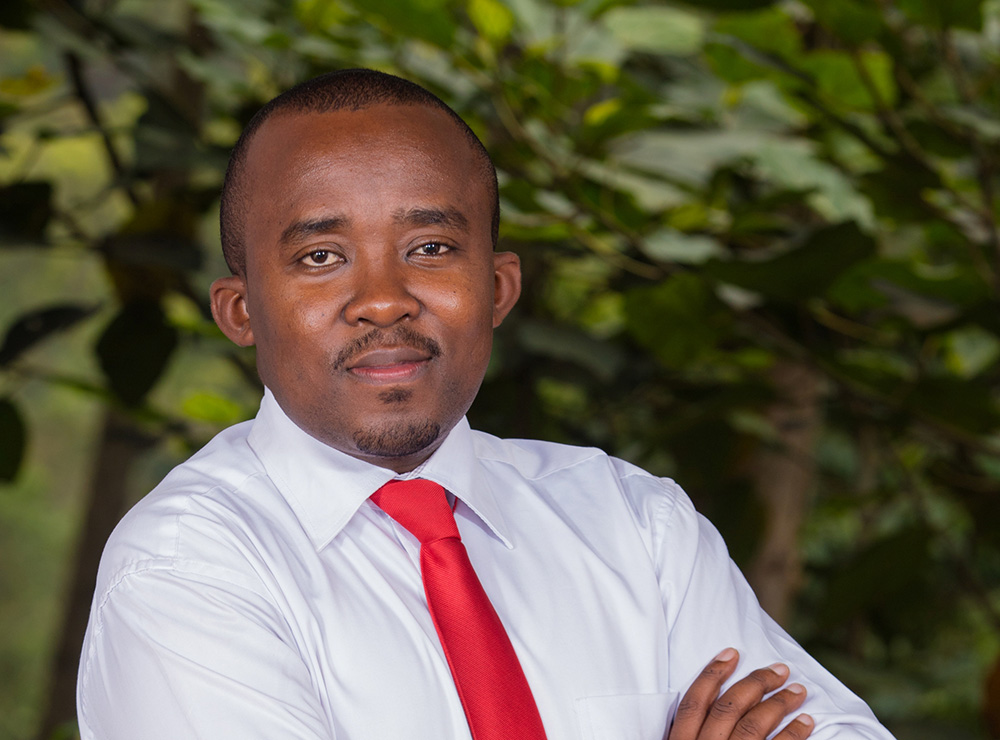
“We look forward to seeing her next chapter unfold,” says Mwirigi.
Najjuka’s gaze extends beyond her own trajectory. She speaks of what the Department could become. Furnished and equipped with industry-standard equipment, newsroom simulations, and deeper investment in data journalism as prayers. Her excellence is not self-congratulatory, but it is forward-looking.
“The University should support the Department to procure industry-standard equipment. Access to high-quality cameras, sound booths, and updated editing software like Adobe Creative Suite is critical to our learning environment,” she says.
Adding that, “We need a newsroom simulation, a physical or digital space where students work under real-time deadlines to produce content for the public. That would prepare us for industry and even strengthen the University’s own media platforms.”
In an era defined by metrics, algorithms, and digital traceability, data journalism is no longer a niche skill but a sine qua non of credible reporting. “There should also be more focus on data journalism and search engine optimization. These are no longer optional skills. Students would benefit immensely from stronger training in these areas.”
Dr. Aisha Nakiwala, the Head, Department of Journalism and Communication, says the faculty are very proud that she is graduating with a First Class—the only one in this year’s cohort.
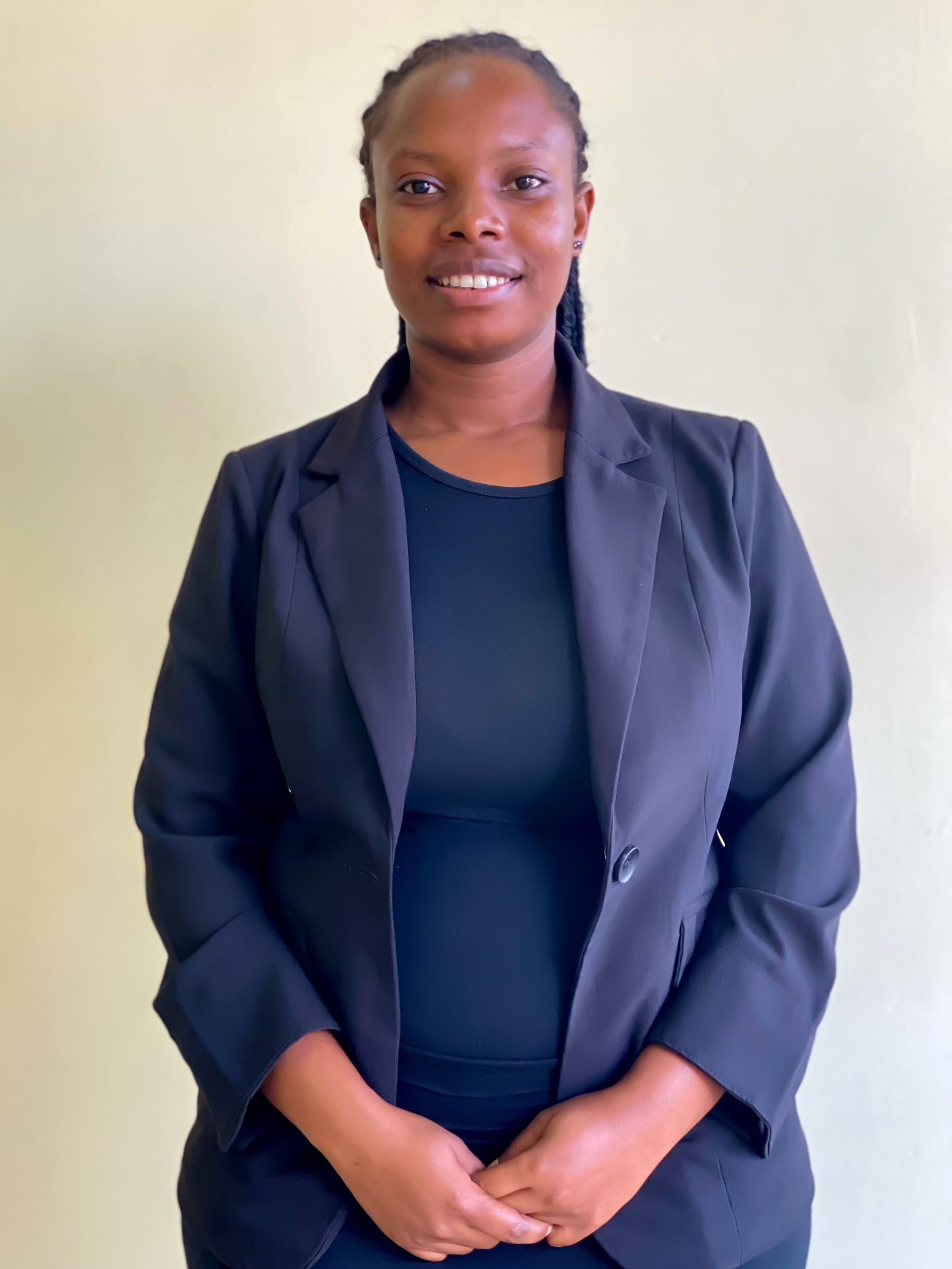
“This achievement reflects not only exceptional intellectual ability but also discipline, resilience, and sustained dedication to the highest standards over four years. Graduating with first-class honors is no small feat; it requires consistent outstanding performance.
“Her accomplishment sets a powerful example for continuing students and reaffirms our department’s commitment to nurturing excellence. We are confident she will make meaningful contributions to the communication profession and society at large,” says Dr. Nakiwala.
On graduation day, applause will crest and recede. The gowns will fold back into wardrobes. The transcripts will be filed away in cabinets. But something quieter will endure; a young woman from Nabbingo who once missed her Law mark, who spent 20 hours a week on the road, who discovered that storytelling is power, and who now walks into Freedom Square not by accident, but by intention.
Life, as she has come to understand it, lives on.
Humanities & Social Sciences
Dr. Pamela Khanakwa Honored for Steering Record 18 PhD Candidates for the Mak 2026 Graduation
Published
1 month agoon
January 23, 2026By
Jane Anyango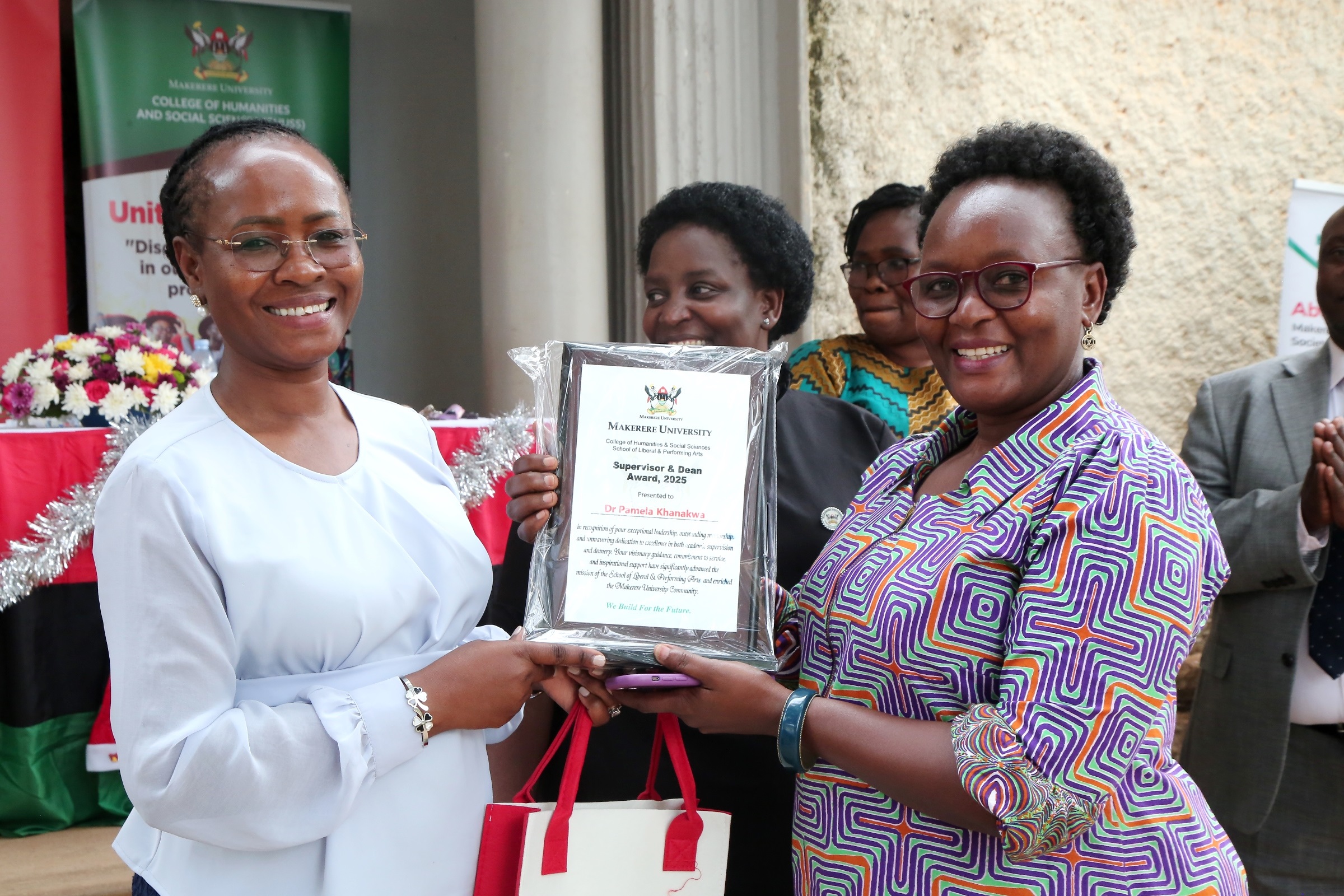
Six personally supervised, three completed in record time, as School of Liberal and Performing Arts sets a historic milestone. Dr. Pamela Khanakwa got the Award as Best PhD Supervisor and Dean
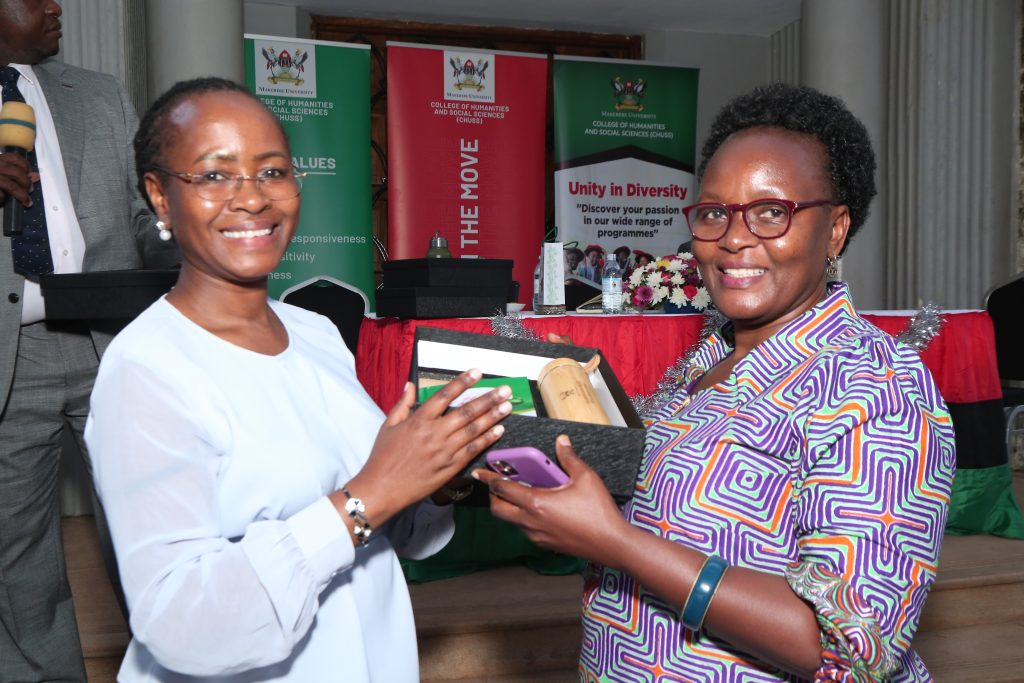
A Historic Academic Milestone for SLPA
The College of Humanities and Social Sciences (CHUSS) recognised the Dean of the School of Liberal and Performing Arts (SLPA), Dr. Pamela Khanakwa, for outstanding academic leadership that has seen the School field 18 PhD candidates for the next 2026 Makerere University Graduation Ceremony scheduled for 24th-27th February. Remarkably, six of these doctoral graduates were directly supervised by Dr. Khanakwa, with three completing within the official three-year timeframe, an exceptional achievement in graduate training. The recognition was announced during the CHUSS End-of-Year Get-Together, where staff applauded Dr. Khanakwa’s dedication, humility, and relentless commitment to postgraduate supervision and timely completion.
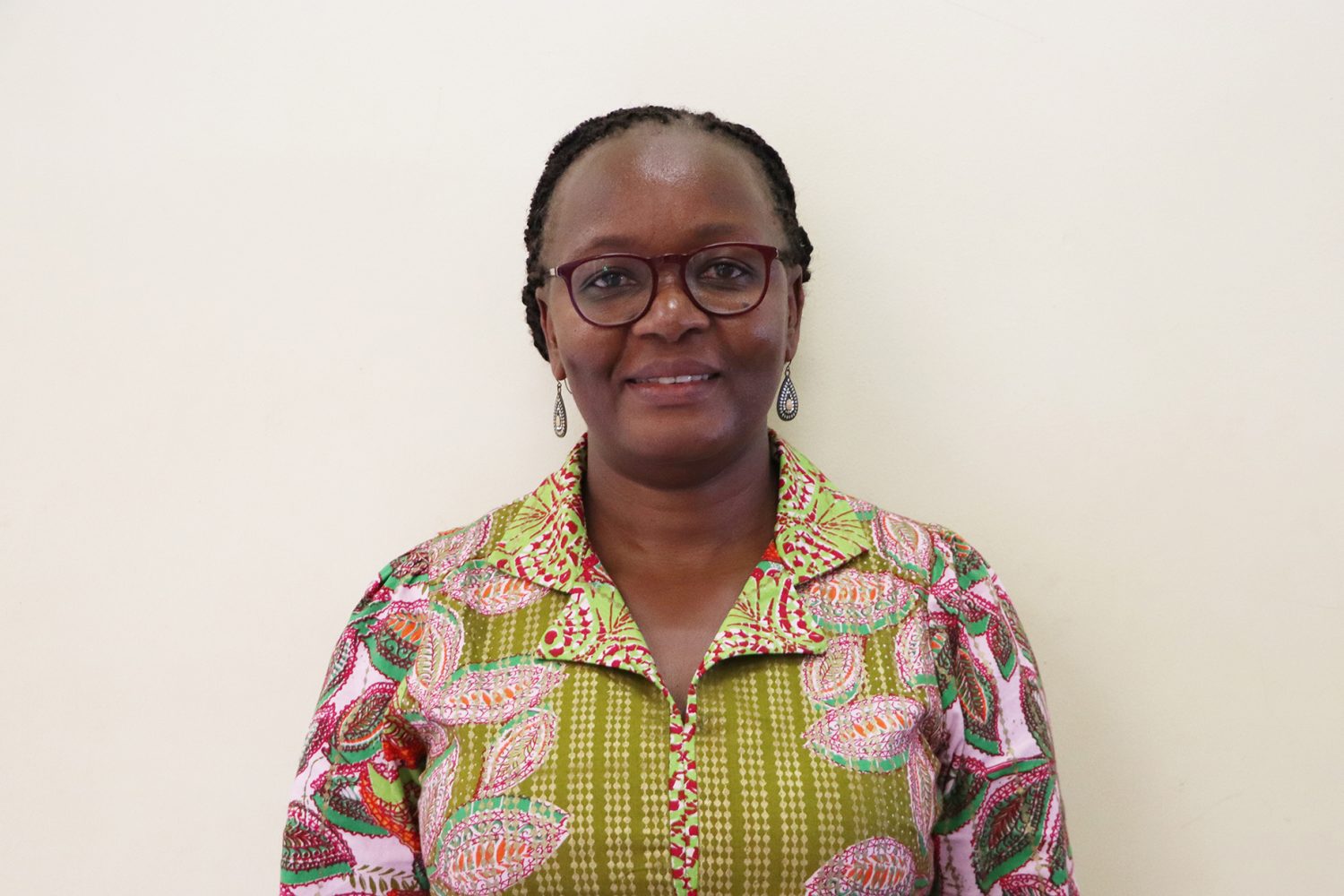
Message to Academic Staff
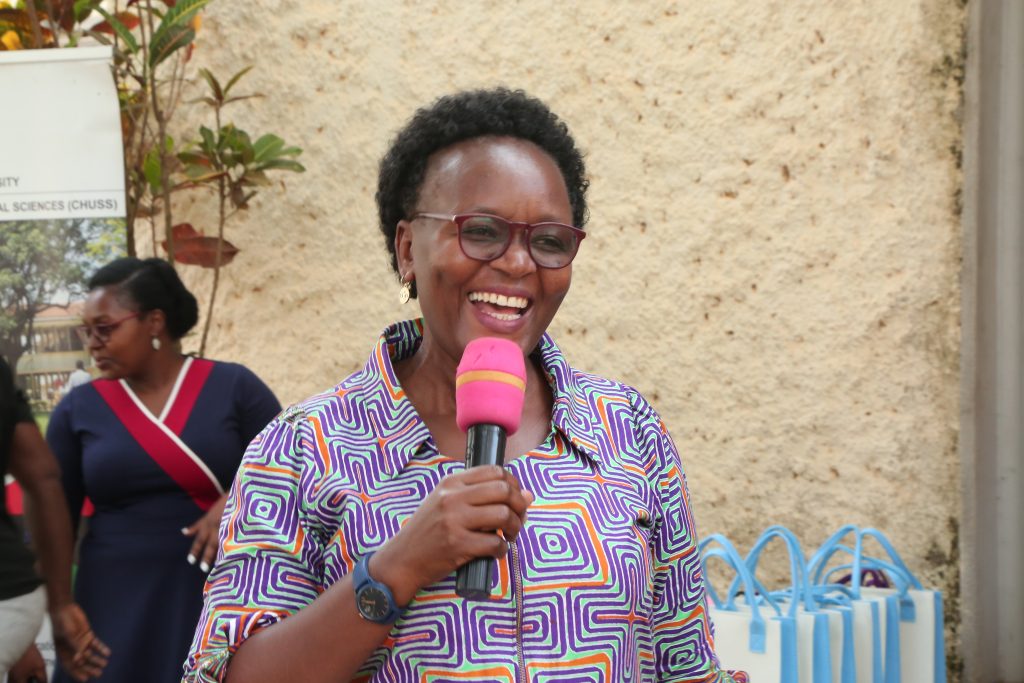
Q: What message do you have for your staff following this achievement?
Dr. Khanakwa:
First, I celebrate my staff and thank them for their dedication to supervision and student support. Academic work is demanding, and material rewards are often limited, but the true satisfaction comes from seeing students succeed.
I encourage my colleagues to remain committed. Yes, the workload is heavy, but many things are possible with dedication and teamwork. Let us continue working for the good of our students, our School, and Makerere University.
Leadership Rooted in Humility
Q: Many colleagues describe you as humble, down to earth, and hardworking. What shapes this character?
Dr. Khanakwa:
I think it is largely my upbringing. My mother was a primary school teacher from the 1950s until the mid-1980s. She worked extremely hard to raise us, combining teaching with farming to ensure we had school fees and basic needs. From her, I learned humility, discipline, and the value of hard work.
I also learned that leadership positions are temporary. You occupy them today, and tomorrow you move on. So humility is essential.
My graduate training also shaped me significantly. My PhD supervisor emphasized that graduate study is a full-time job and that results matter more than noise. Let people see your work through outcomes, not announcements.
Supervision as a Two-Way Commitment
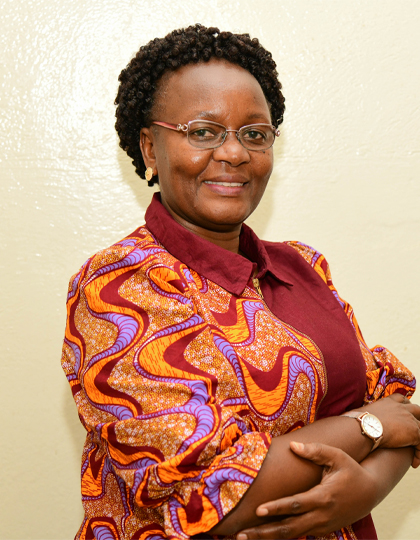
Q: How would you describe your supervision style?
Dr. Khanakwa:
I read my students’ work thoroughly, word by word. Sometimes my comments are tough, but they are honest. Supervision is a two-way commitment. I give feedback, but students must also respond and remain engaged. When that relationship works, progress happens.
Balancing Leadership, Scholarship, and Family
Q: How do you balance being a Dean, scholar, wife, mother, and daughter?
Dr. Khanakwa:
Honestly, I am not sure I balance perfectly. My mother lives far away in Bukwo, so visiting requires careful planning. My children grew up understanding the demands of academic life. I pursued my PhD in the United States and spent long periods away, but we adapted as a family.
Work has become part of my lifestyle. I use weekends to read dissertations, review manuscripts, and write. Sometimes my children ask if I ever sit without working, but this is the commitment I made. As we often say jokingly, “We humbly applied for the job, so let us do the job.”
Scholarship Beyond Supervision
Dr. Khanakwa is also an active scholar and editor. In the past year alone, she has:
- Edited scholarly volumes on archives, memory, method, and pedagogy
- Published a book with Routledge Companion
- Co-authored journal articles and book chapters with graduating students, including Priscah Asiimwe and Anatoli Lwasa Mpijja
“I feel an obligation to write with students,” she notes. “It takes time, energy, and commitment, but it is part of academic mentorship.”
Who Is Dr. Pamela Khanakwa?
Dr. Pamela Khanakwa is the Dean, School of Liberal and Performing Arts, College of Humanities and Social Sciences, Makerere University. She is a seasoned scholar, supervisor, administrator, and mentor whose leadership continues to redefine graduate training excellence. Details about Dr. Pamela Khanakwa can be accessed at: https://chuss.mak.ac.ug/en/personnel/pamela-khanakwa/
More details are available in her attached curriculum vitae.
The CHUSS End- Of-Year-Get-Together
On 12th December, 2025 the college leadership organised a get-together end of year gathering to take stock of the achievements, challenges and brainstorm together on how to move forward. The event was marked by entertainment, team building games, appreciation speeches, sharing a meal and a Christmas package for every staff
Retirees and staff recognised
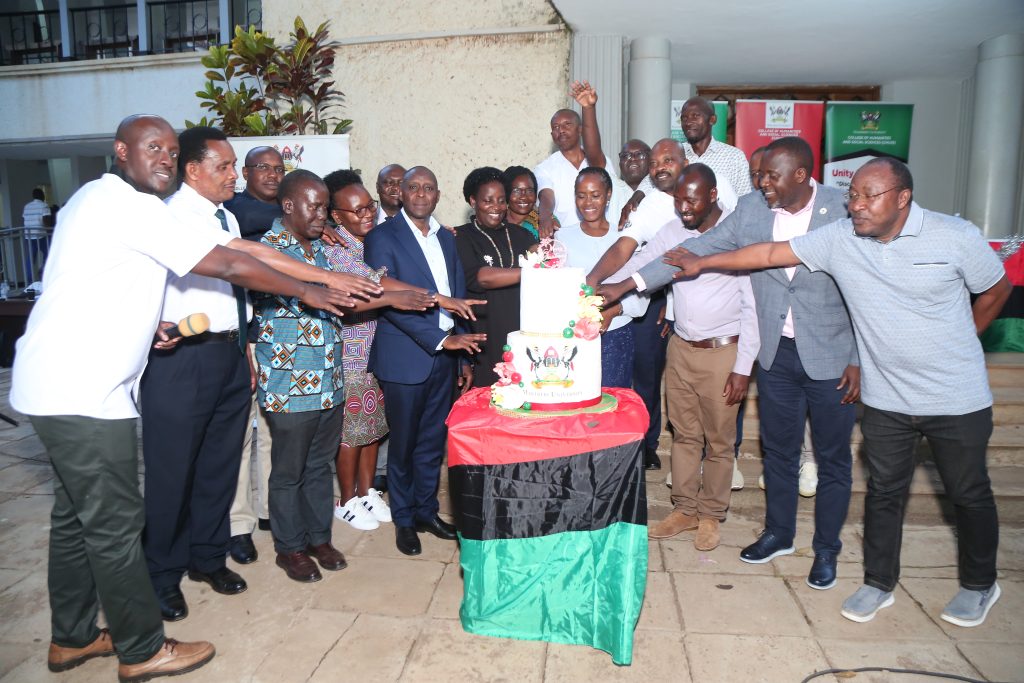
Five retired staff Dr. Micheal Wangotta Masakala, Dr. Anatole Kirigwajjo and Dr. Jackson Kizza Mukas (all from the School of Languages, Literature and Communication), Assoc. Prof. Florence Nansubuga (School of Psychology), Dr. Tusabe Gervase (School of Liberal and Perforing Arts) and Ms. Scovia Nganda Sekweyama (secretary from the School of Social Sciences) were recognised for their dedicated services to the university.
In addition to Dr. Pamela Khanakwa’s Award as Best PhD Supervisor and Dean, Ms. Birabwa Florence scooped the award of Best Registrar of the year. Birabwa is the registrar for the School of Liberal and Performing Arts.
Administrative and support staff including Ms. Mary Gyezaho and Annet Kashumbusha(both administrative secretaries in the Principals office), Farouq Lule (IT Officer), Godfrey Kakooza (cleaner), Charles Sebuguzi (driver) and Jane Anyango (Communications officer) were recognise with awards for outstanding service. Dr. Mohamed Mayanja Kajumba was from the School of Pyschology was recognised as the person with an outstanding talent in Handwriting.
The celebrations held in the Arts quadrangle were graced by the Vice Chancellor Academic Affairs Prof. Sarah Ssali and the Deputy Vice Chancellor in charge of Finance and Adminstration Prof. Ireeta Tumps.
Humanities & Social Sciences
Ugandan Journalists Trained on Peace and Gender-Sensitive Reporting Ahead of 2026 Elections
Published
2 months agoon
January 9, 2026By
Jane Anyango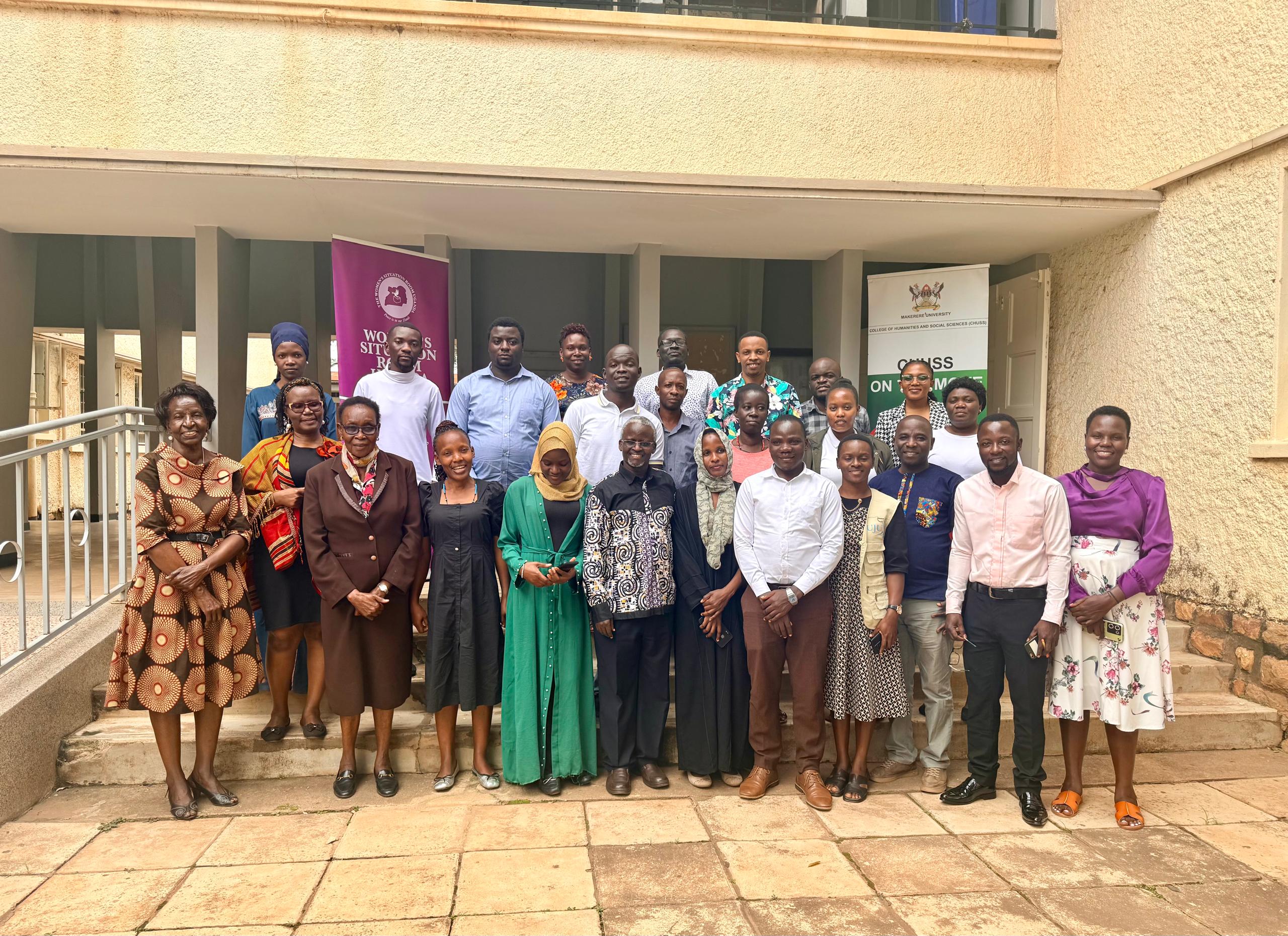
Kampala, Uganda – January 9, 2026
Ahead of the January 15 general elections, Ugandan journalists have undergone specialized training on peace and gender-sensitive reporting to ensure responsible media coverage during the election period. The two-day training, held from 8th to 9th January 2026 at Makerere University’s College of Humanities and Social Sciences Smart Room, was organized by the Women’s Situation Room (WSR) in partnership with various stakeholders and brought together journalists from across print, broadcast, and online platforms.
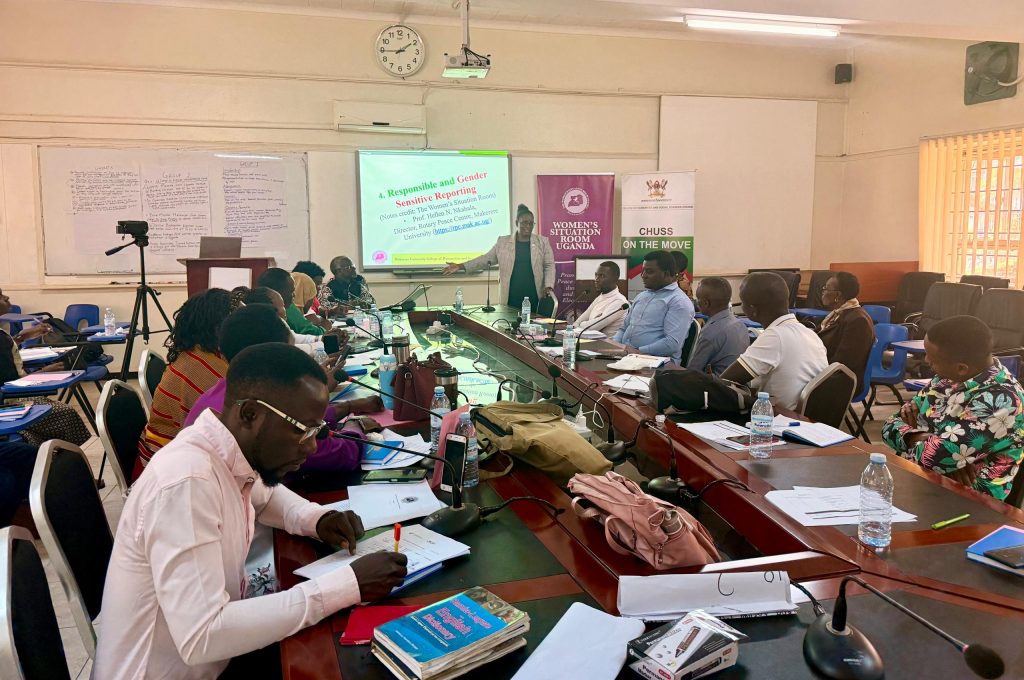
The main objective of the training was to strengthen the capacities of media in reporting and documenting electoral processes in a responsible and gender-sensitive manner. The specific objectives included: strengthening journalists’ skills to cover the 2026 elections in a fair, balanced, gender-sensitive, and non-violent partisan way; enhancing the role of media to enable citizens to be well-informed and actively participate in the election process; ensuring focused and balanced reporting on peace during and after elections; and strengthening partnerships between the WSR and media houses during the election period.
The training covered multiple critical modules. Day one focused on responsible conflict-sensitive reporting, emphasizing principles such as balance, impartiality, and accuracy. Participants explored the role of media as a relayer of the population’s voice, election monitor, catalyst for social cohesion and reconciliation, contributor to the accountability of political actors, and a platform for detecting and debunking digital media misinformation and hate speech.
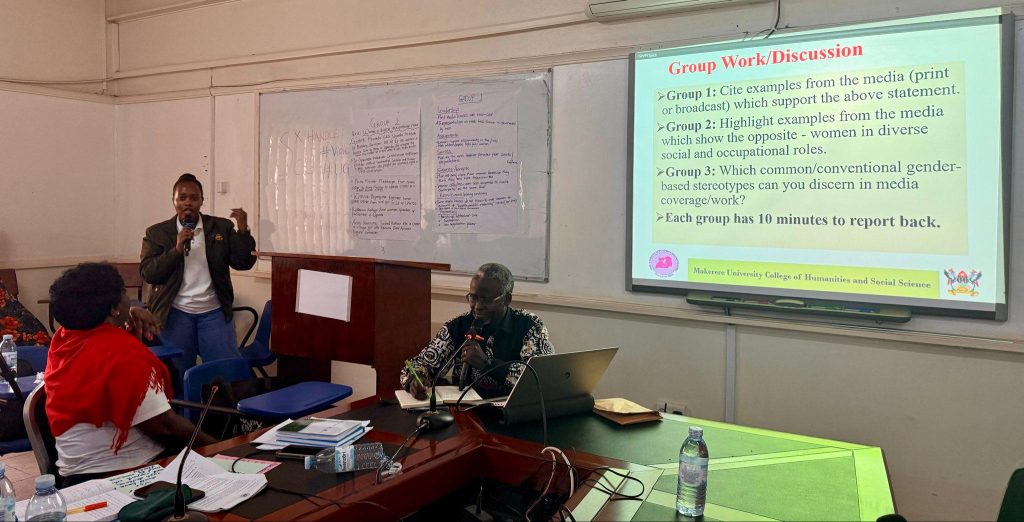
Day two addressed responsible and gender-sensitive reporting. Key aspects included the definition of gender-sensitive reporting, how to become a gender-sensitive reporter, critical elements in reporting with gender awareness, packaging gender-sensitive stories, and a checklist for detecting and avoiding gender-insensitive reporting.
Her Lordship, retired Judge Justice Mary Mayitum, emphasized the importance of peace as the foundation of development and democratic engagement. “Because we value peace more than anything. Without peace, really, you can do nothing. But where there is peace, you can have time to reflect, discuss with others, and join in meaningful dialogue,” she said. She warned that the country’s past conflicts, such as those in Gulu, underscored the necessity of maintaining national harmony.
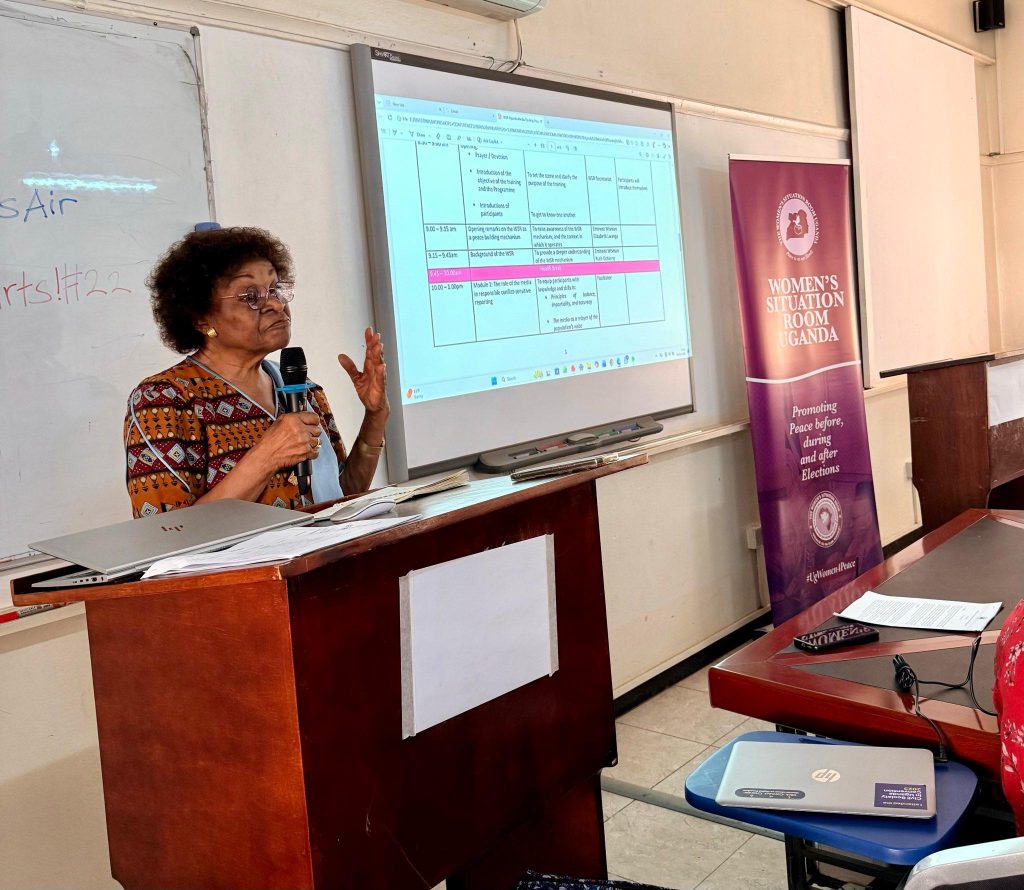
Justice Mayitum also urged other key election stakeholders to uphold peaceful conduct. “Being peaceful is the very heart of life. We have spoken to police, security personnel, political parties, and the Electoral Commission. We want politicians to have a code of conduct and to understand that it’s okay to think differently without fighting or hating one another,” she added.
Dr. William Tayebwa, lead facilitator and senior lecturer in the Department of Journalism and Communication at Makerere University, said, “This training is about conflict-sensitive reporting, peace journalism, and gender-sensitive reporting in the context of the elections. The emphasis was on giving female political candidates a voice while ensuring journalists report responsibly on election-related matters.”
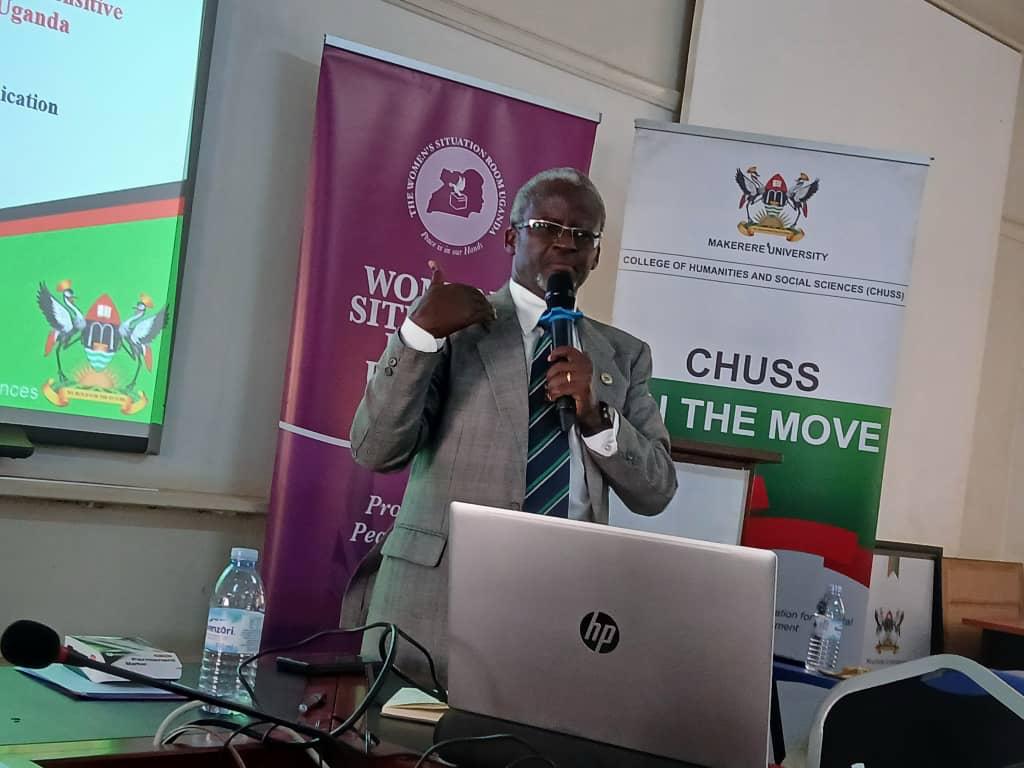
Participants described the training as timely and impactful. Tony Banizengabo of CBS Wakiso District said, “We’ve benefited a lot. We’ve been trained to write stories which bring peace, not conflict. Ahead of the elections, we are very ready to be part of peacemakers.”
Dorcas Kimono of UBC TV Kampala added, “It was so timely and rich. We learned how to report without promoting or fueling violence, giving voice to victims without angering them or encouraging violators. This is very vital, especially as we approach the 2026 elections.”
The training aims to equip media personnel with the knowledge and skills to uphold professional ethics while contributing to a peaceful, inclusive, and gender-sensitive electoral process.
Trending
-

 Humanities & Social Sciences2 days ago
Humanities & Social Sciences2 days agoMeet Najjuka Whitney, The Girl Who Missed Law and Found Her Voice
-

 Health7 days ago
Health7 days agoUganda has until 2030 to end Open Defecation as Ntaro’s PhD Examines Kabale’s Progress
-

 Agriculture & Environment5 days ago
Agriculture & Environment5 days agoUganda Martyrs Namugongo Students Turn Organic Waste into Soap in an Innovative School Project on Sustainable Waste Management
-

 General7 days ago
General7 days agoMastercard Foundation Scholars embrace and honour their rich cultural diversity
-

 Health2 weeks ago
Health2 weeks agoCall for Applications: Short Course in Molecular Diagnostics March 2026
